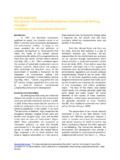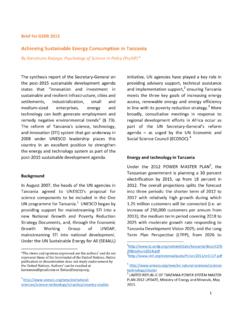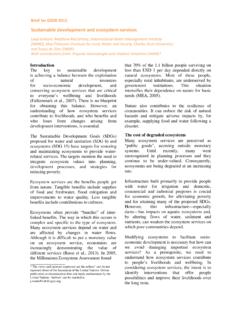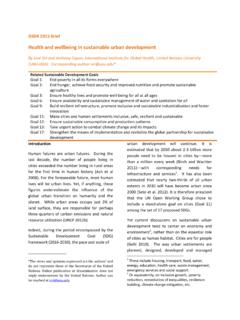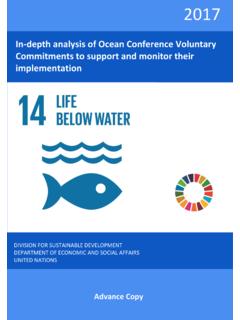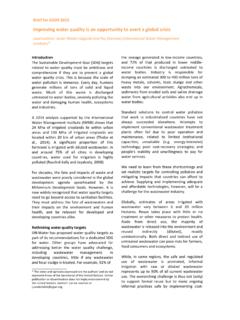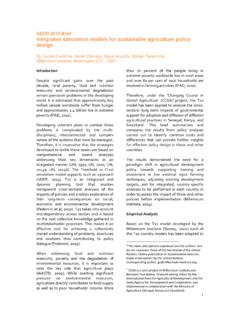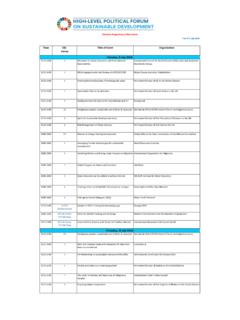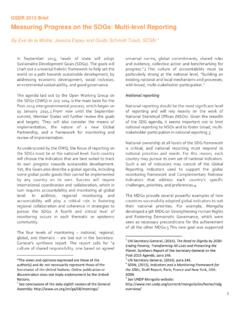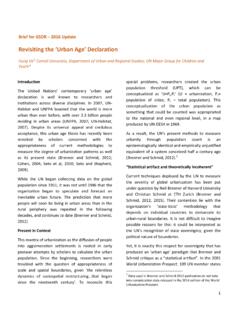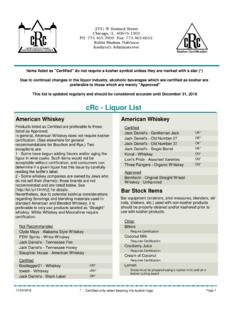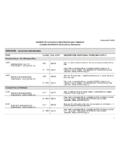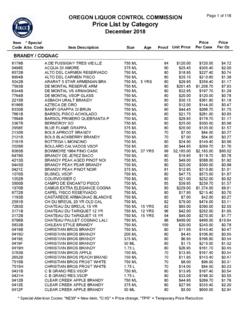Transcription of Beer, Wine and Spirits Producers’ Commitments to Reduce ...
1 beer , wine and SpiritsProducers Commitments toReduce Harmful DrinkingCommitments 2013 Progress Report2We are proud to say that in our first year we have already: defined specific, measureable targets for all 10 action areasof the Commitments , which we report on here for the first time,and which will allow us to assess our progress going forward; run 135 education programs across the world, eitherindividually or in partnership, aimed at preventing and reducingunderage drinking. Together, these have directly engagednearly 1 millionunique young people under the legal purchaseage in alcohol education programs and more than 500,000parents, teachers, and community leaders; established that more than 96% of our advertising iscompliant with our 70/30 rule in other words, that adultsmake up at least 70% of our audiences; found that none of the signatories products containedexcessive quantities of stimulants( , more than 200 mg/l); developed guiding principles for responsible digitaladvertising,which are now out for these highlights suggest, it was a good first year.
2 We haveachieved a great deal and learned a great deal, and we arealready building on that learning in 2014 and using it to accelerateour programs. However, we are very aware of how much morethere is to do. This report sets out our plans for the future, and theway these plans will be implemented, measured, audited, andreported. Our aim throughout is to present both the issues andour activities in a straightforward, transparent, and honest way,and in that spirit we welcome your 2013, 13 of the world s leading beer , wine , and Spirits producers came together to make ground-breaking Commitments to Reduce the harmful use of alcohol. This report sets out the progress made so far, and the actions now Summary3 Contents4 About this Report6 Introduction8 Where we stand10 Our approach11 The Commitments11 commitment 1: Reducing underage drinking18 commitment 2: Strengthening and expandingmarketing codes of practice 23 commitment 3: Providing consumer informationand responsible productinnovation26 commitment 4: Reducing drinking and driving30 commitment 5: Enlisting the support of retailers toreduce harmful drinking34 Priorities for 201435 Feedback36 Independent Assurance Report Please click to view your contents4 This is the first report of the beer , wine and SpiritsProducers' Commitments to Reduce Harmful Drinking,covering the activities and initiatives undertaken in the year2013.
3 Some of these activities have been carried out bythe signatories as a group acting together, some havebeen run by one or more signatories in partnership withother organizations and NGOs, and some have been runby individual signatories. Some data has therefore beencollated centrally, and some through individual signatories. Although a signatory at the announcement of theCommitments in October 2012, UB Group s United SpiritsLtd was acquired by Diageo prior to the launch of theCommitments in 2013 and therefore it has not participatedin the 2013 report. The two Japanese trade associations,the Brewers Association of Japan and the JapaneseSpirits and Liqueur Makers Association, made a jointsubmission in relation to their activities supporting theCommitments in the Commitments were first established, advice was sought from Accenture Sustainability Services on the development of performance indicators. Accenturehelped us to collaboratively develop some robustdefinitions with the signatories for each of the 18performance indicators to help ensure consistency,minimize ambiguity, and establish what was and whatwas not within the scope of each performance example, it was determined that signatories wouldreport only activities undertaken in markets where they are commercially active.
4 A summary of the performanceindicators including definitions and scope of coverage, is available on the Commitments website About this Report5A data acquisition process was also devised. Signatorieswere aware at the outset that there might be some issueswith data quality; Accenture helped us identify andappropriately address these, both before and during thereporting report details the outputs of the first annual reportingcycle and is a valuable baseline for the signatories andwider readership. The principles we have adopted incompiling this report are as follows: We have ensured thatall the information given is accurate, complete, andsufficiently detailed to allow readers to make a fairassessment of our performance in 2013. The reportprovides a balanced view, covering positive achievementsas well as areas that require improvement, or where workhas not yet commenced, bearing in mind that theCommitments cover a five-year period, and it has not beenpossible to make progress on all 10 action areas in thefirst year.
5 Looking ahead, we will ensure that readers willbe able to assess our progress over time according toconsistent criteria, clearly reported. After a rigorous process of review and checking, and withthe support of Accenture, we are confident that this reportoffers an accurate picture of the range and scope ofactivities underway across the world to deliver on theCommitments and the overall progress achieved during2013. This report also provides a robust baseline againstwhich to measure future progress. For a full list of all theindustry initiatives being undertaken across the world anda comprehensive account of the issues relating to theharmful use of alcohol, please see our initiatives world s leading producers of beer , wine , and Spirits havebeen working for many years, both individually andcollectively, to address the problems caused by harmfuldrinking. Real progress has been made in several importantareas, both in addressing specific problems, and in changingpublic significant milestone was reached in 2010, when GlobalActions on Harmful Drinking at the creation of new programs across the world coveringthree key areas of activity, including drink driving initiatives insix countries, the strengthening of marketing codes in 11countries, and a study to assess the health and economicimpacts of noncommercial alcohol production.
6 These new programs joined the hundreds of others alreadyunderway, and in 2013 we decided to build on what hadalready been achieved, and expand work in this area toinclude five Commitments covering: Reducing underage drinking Strengthening and expanding marketing codes of practice Providing consumer information and responsibleproduct innovation Reducing drinking and driving Enlisting the support of retailers to Reduce harmfuldrinkingWe worked closely with the International Center for AlcoholPolicies (ICAP) and the Global Alcohol producers Group(GAPG) to develop the Commitments , which are designed tosupport the World Health Organization (WHO) GlobalStrategy to Reduce the Harmful Use of commitment has clearly defined goals and a five-yearaction plan, during which time progress will be independentlyaudited and publicly reported. We appointed AccentureSustainability Services to work with us to develop a full set of Key Performance Indicators (KPIs), which we have outlinedin the sections that follow, and KPMG Sustainability hasreviewed this report (see page 36 for their Assurance Report).
7 There will also be ongoing updates Commitments are the most ambitious andcomprehensive set of initiatives we have ever undertakentogether to address harmful drinking, and we hope that otherbeer, wine , and Spirits producers will join the current 13signatories in achieving them. We are also working activelywith other organizations at both a global and a national levelto implement the Commitments , including academicresearchers, educational NGOs, and governmental bodies. In this report, we look at each of the Commitments in turn,setting out what we aim to do, how results will be measured,and what has been delivered so far. In some areas there arealready tangible results; in others, the complexity of theissues requires more research and preparation. In total,however, we believe that solid progress had been made anda strong foundation has been established that will allowaccelerated progress and deliver impactful results in the nextfour signatories to the Commitments : Anheuser-Busch InBev Bacardi Limited Beam Inc.
8 Brewers Association of Japan Brown-Forman Corporation Carlsberg Diageo Heineken Japanese Spirits & Liqueurs Makers Association Molson Coors Pernod Ricard SABM iller UB Group8 beer , wine , and Spirits have been produced and enjoyed forthousands of years. Millions of people enjoy alcohol every day in aresponsible way, but harmful drinking may cause health and socialproblems for individuals and for society as a whole. For all these reasons, we support the WHO Global Strategy toReduce the Harmful Use of Alcohol and the global voluntary targetof reducing harmful use of alcohol by at least 10% in the WHOG lobal Action Plan for the Prevention and Control ofNoncommunicable Diseases. Achieving this aim will require theconcerted efforts of many groups, including public health bodies,governments, and retailers, and we are fully prepared to play ourpart in the areas we have identified under the Commitments , andothers where we can make a positive contribution.
9 The Commitments are an expression of our core beliefs aboutalcohol, society, and the role we can believe that reducing harmful drinking will benefit societyand our businesses problems created by alcohol misuse don t just cause harm toindividuals and communities, they also damage the publicperception of our industry. Our brands and the way we conductbusiness are at the heart of our success, and when our products aremisused, our reputation suffers. Promoting responsibleconsumption is the only way to ensure a sustainable future both forour businesses, and for society as a respect the rights of adults to choose to drink alcoholbeverages, or to choose not the drink , wine , and Spirits are central to many cultures around the worldand often play an important role in celebrations and other socialoccasions. Most adults who choose to drink consume beer , wine ,and Spirits moderately and responsibly, and we believe they shouldhave the right to do so.
10 Likewise, we respect the rights of those whochoose not to drink. We do not set out to market our products tothose who do not want to drink, and many codes of marketingpractice include provisions to prevent abstinence from beingportrayed we standOur beliefs9We believe that all alcohol beverages sold in a society shouldbe appropriately and effectively fully acknowledge that alcohol drinks can be abused, and that this can cause significant harm both to individuals and thecommunity. beer , wine , and Spirits need to be appropriately andeffectively regulated, taking into account national circumstances andlocal believe that alcohol consumption patterns are stronglyinfluenced by cultural and religious towards alcohol vary considerably across different culturesand societies. In many European countries, beer , wine , and Spirits are central to cultural and social life, but in some countries they areprohibited. Attitudes about alcohol are influenced by many factors, includingclimate, religion, education, and the cultural acceptance or non-acceptance of drunkenness.
